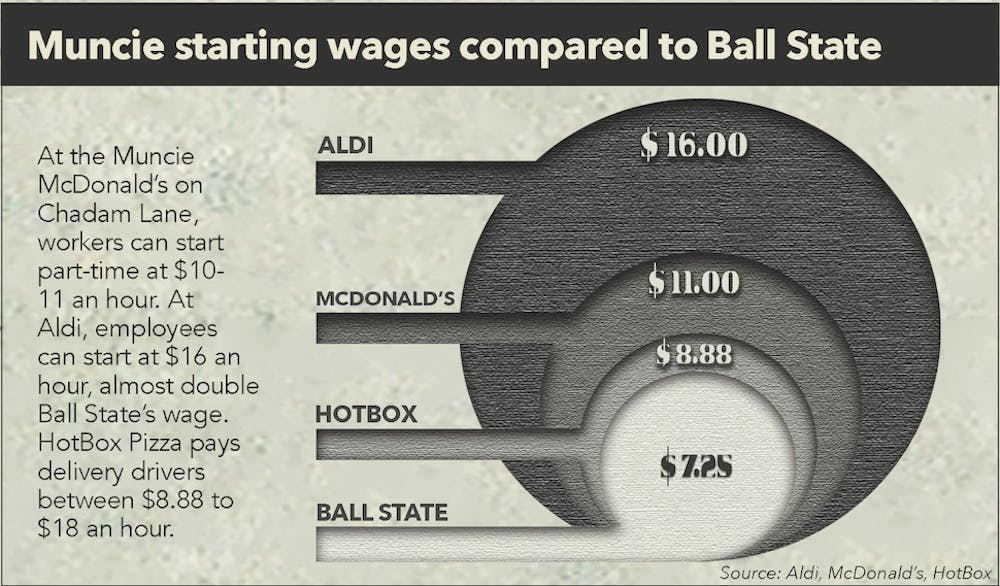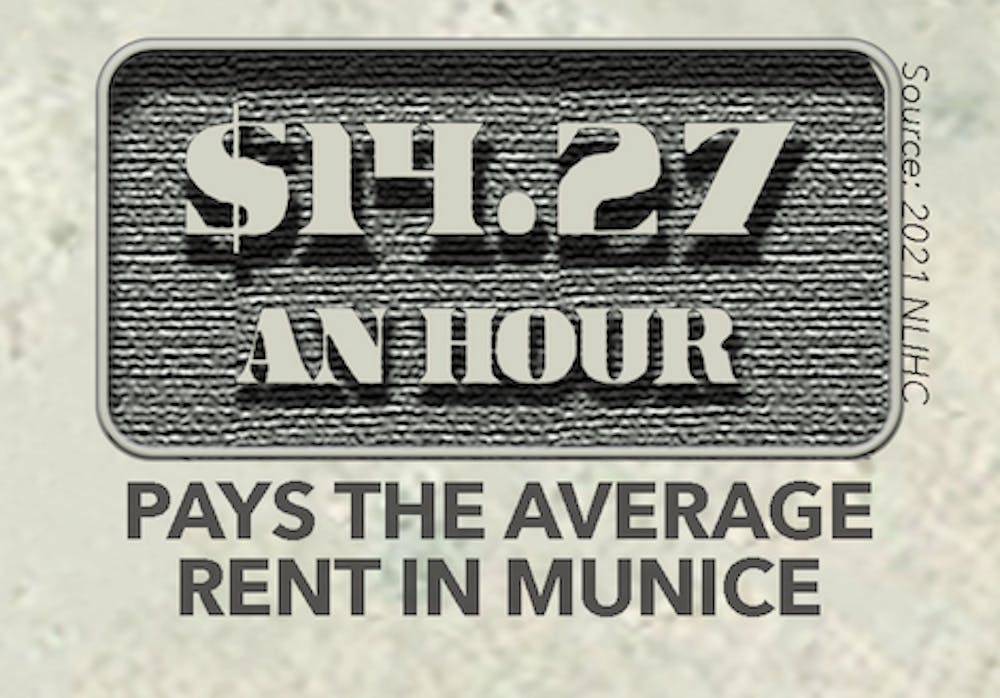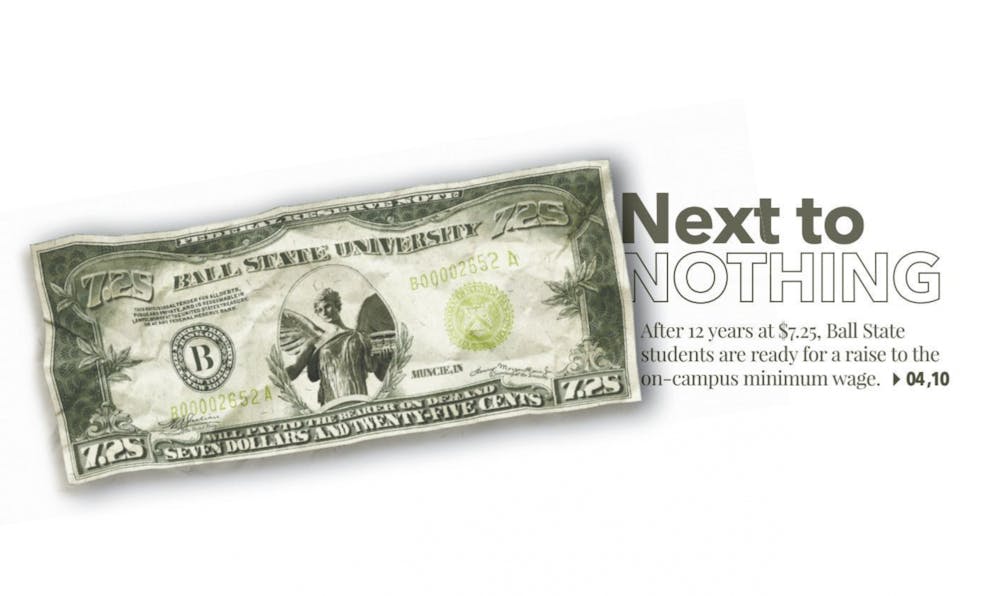Lila Fierek is a sophomore news journalism major and writes “[Hey There Duh-Lila]” for The Daily News. Her views do not necessarily reflect those of the newspaper.
At 15 years old, I took my first job at a local ice cream shop. The starting pay — $7.25 an hour, also Indiana’s minimum wage — made sense for a 15-year-old girl who couldn’t drive and didn't have to pay for everything. My parents gave me money for food, and I wasn’t one to shop or buy things often. I had a school, school, school mentality, so nothing else mattered.
Minimum wage made sense for 15-year-old me, but it didn’t when I went to find a job at Ball State. I didn’t expect to be offered the same amount I was making when I was 15.
Even compared to similar jobs in Muncie, Ball State falls behind when it comes to pay rate. For me, that lower rate meant seeking work off campus. I waited until September to work, trying to get more comfortable with my schedule. I needed a job fast, so I drove around town and applied to the two jobs that had signs for open interviews.
I received two offers, so I took one where I would make $9 an hour and told them I would work up to 20 hours a week, just like an on-campus job. I knew if I asked for too few hours, no one would want to hire me. I had a fairly busy schedule, though, so I knew anything more than 20 hours would be too much.
I was overwhelmed after the first week, and I realized quickly how inflexible off-campus jobs can be. You don’t just get off fall break like you do with an on-campus job. You can’t ask for a day off of work because you have a big test or have been falling behind in your classes.
This downtime is crucial for college students. Weekends and holidays are time for us to catch up on homework and engage in activities, which we don’t get to do when all we do is work.
I’ve worked a full-time job before — I’ve done 40-plus hours a week at a rate of $13 an hour. I felt valued and wanted to work harder because of it. I don’t mind getting paid less, but stepping down to $7.25 would have been a pretty big cliff dive, both mentally and financially.
I worked throughout high school, but for some reason, I just couldn’t do it in college. I went from class to work to doing homework, falling behind in my classes and getting little to no sleep. I missed all of my clubs because I had to work, and school has to come first. I felt bad asking to cut my hours after only working there for a week, but my mental health was crashing.
So, I did something I’ve never done before — I quit. Fortunately, my job was understanding, but having an off-campus job was a lot harder than I thought.
All on-campus jobs for undergraduate students at Ball State University start at a measly $7.25 an hour — a federal standard that fewer than half of states still practice — with the option to apply for raises up to $9 an hour.
Simply put, it’s unreasonable. All of this is before taxes are taken out, which, according to the Indiana Department of Revenue, is at a rate of 3.23 percent in Indiana. This tax rate doesn’t include other fees like Social Security and Medicare. Additionally, there is no requirement that a student is guaranteed to work the full 20 hours on an average week, making tuition and room and board even harder to pay off.

If you plan to rely on an on-campus job to pay for college, good luck Charlie Cardinal.
The Daily News contacted Ball State’s administration and asked specific questions about the number of employees, why Ball State pays a minimum wage of $7.25, why they only allow 20 hours per week and similar questions.
Ball State did not answer these questions and instead responded with a blanket statement with the university’s goals.
“Student wages has been a recent topic of discussion among University leadership. A working group is being convened to explore and evaluate the different position roles among student workers. The goal is to understand student worker pay bands, the responsibilities that accompany each position role and wage band, and to establish a clear set of wage protocols based on each role. The University will also evaluate the overall impact of any proposed pay scale adjustments. The goal of the working group is to develop a set of guidelines and recommendations for student position classifications and associated wages by the Fall 2022 hiring cycle,” vice president of student affairs Ro-Anne Royer Engle said in a statement.
They were not available for further comment, which tells me a change likely isn’t coming anytime soon. Ball State needs to get with the times and raise its wages.
Some Ball State students opt to live off campus because it can often be cheaper than paying for room and board. But, making $145 a week probably isn’t going to be enough to pay for rent, utilities and food every month. In my duplex, it costs me about $500 a month with utilities and one other roommate, and I only pay for electricity and gas.
This makes everything harder to pay for on a consistent minimum wage of $7.25, one that, according to the U.S. Department of Labor, hasn’t changed in the United States since 2009.
According to the Society for Human Resource Management, America is in a nationwide job shortage, so places are upping their pay to find workers. We live in a country where, according to Pew Research Center, 62 percent of adults want the minimum wage to be $15 an hour. It would be beneficial for Ball State to get ahead of the times and do what students need.

If Ball State wants to be seen as a progressive university that cares about its students, then they need to show it, and increasing student pay is a prime opportunity. According to the International Labour Organization, studies have shown higher wages can contribute to higher labor productivity. Getting paid more motivates workers to work harder, so why wouldn’t Ball State want the most productive work possible?
It is unjust for Ball State to pay students so little that they can’t even afford a month’s rent, and raising the minimum wage would create plenty of goodwill with their students.
Michael Hicks, economics professor and director of the Center for Business and Economic Research, said increasing Ball State’s pay rate for undergraduate students would have more of an effect on student fees and costs like meal plans and the Student Recreation & Wellness Center than on tuition. Hicks said all of his student employees at his research center are paid off of grants and contracts, though it varies by department and employee.
“I doubt it would cause a significant increase and certainly wouldn’t be a noticeable increase in tuition,” Hicks said.
Hicks said raising the minimum wage on campus has different effects than raising the wage nationally because the amount of people who make minimum wage are dispersed throughout the country, whereas at Ball State, they are all in one place. It’s more noticeable at the university level and has more of an effect the higher it’s raised.
“It's very difficult to hire students who might have financial needs, who need to work,” Hicks said. “And their options off campus short-term are financially better than most of the options on campus. And that's true for universities around the country right now during the COVID period.”
Ultimately, Hicks said, on-campus jobs are good for both students and the university. Students get better educated and are more likely to get career-related experience, surrounded by teachers who can help us learn important skills.
This is good for Ball State because it helps the university to have more successful students and higher graduation rates, Hicks said. Having more experienced students helps graduates get better jobs, and ultimately, that makes the school look good.

This symbiotic relationship between student workers and the university would be more balanced if they would pay us a little more, enough to survive and put food on the table. Like Hicks said, most people who need money have to turn to getting off-campus jobs, but that just makes it harder on them. These perks are great and make on-campus jobs beneficial, but that shouldn’t matter when it comes to pay rate.
Minimum wage is barely enough to survive.
Our work should be valued more by the university. Ball State students cannot support themselves with low-wage jobs alone, and it’s not realistic to juggle school, two jobs and involvement.We know it is not meant to pay for our tuition, but the least they can do is pay us enough to live to the day we can finally pay it off.
Ball State cannot survive without student labor. Andrew Walker, senior communications strategist for the university, said as of Nov. 6, there are 1,765 undergraduate student on-campus employees. Front desk workers, dining hall employees, parking services, research assistants and more — all these jobs are held by student employees.
“Students are just a critical part of making the university operate,” Hicks said. “So how we staff, how we hire and how much we pay is obviously a keen interest in all of us at the university.”
The school needs students to function and, although they are providing us an education, if they are providing jobs, the least they can do is make it fair.
It’s ridiculous to ask students so much for so little.
Contact Lila Fierek with comments at lkfierek@bsu.edu or on Twitter @fierek_lila.





